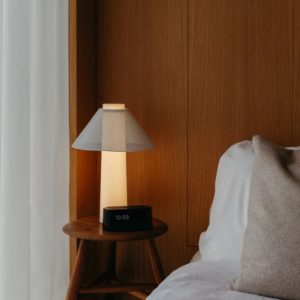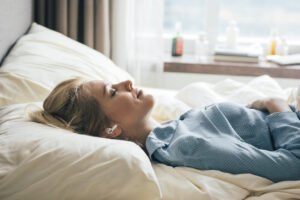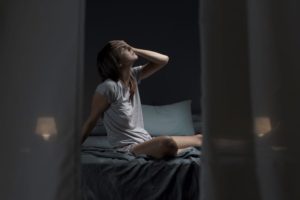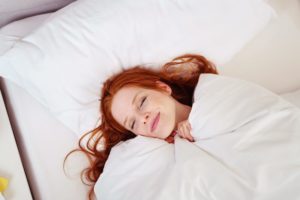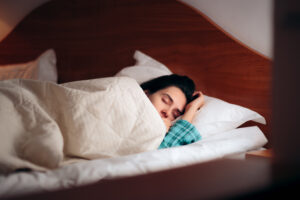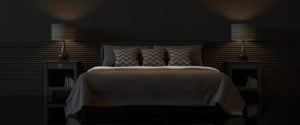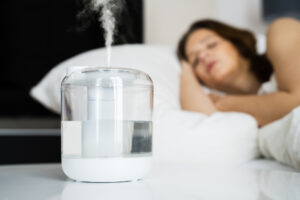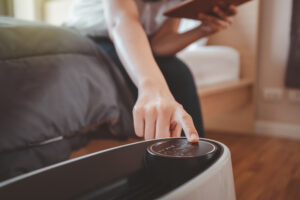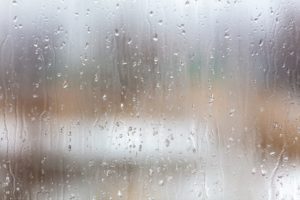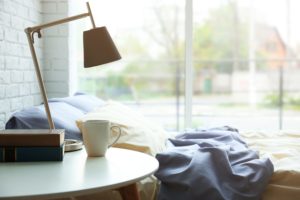When you buy through our links, we may earn a commission. Products or services may be offered by an affiliated entity. Learn more.
How Smell Affects Your Sleep
When thinking about sleep and its relationship to the senses, few people immediately think of smell. Sight, sound, and touch typically receive more attention because of the obvious ways that light, noise, and comfort can impact sleep. While it might not be as immediately apparent, smell can directly affect sleep.
The connections between smell and sleep are subject to continuing research. Learning more about what has been discovered so far provides opportunities to make the bedroom environment more conducive to quality sleep.
The Relationship Between Smell and Sleep
Smell and sleep have a bidirectional relationship . This means that sleep can affect the sense of smell, and smell can affect sleep.
One factor that influences the sense of smell is the circadian rhythm. The circadian rhythm is known for how it promotes sleeping during the night and wakefulness during the day, but it affects numerous other bodily processes as well. Sensitivity to smell can change throughout the day , and lower sensitivity at night helps encourage sleep. Sleep can also contribute to how smell is perceived and remembered.
Research has also shown that smell can have an effect on how long it takes to fall asleep, in addition to overall sleep quality and quantity. Distinct scents may promote better sleep, help people wake up in the morning, or even influence dreams and memory formation during sleep.
Can Certain Smells Help You Sleep Better?
Because of the power of the sense of smell, certain fragrances may contribute to better sleep. Some scents promote relaxation that makes it easier to fall asleep and feel well rested the next day.
Not surprisingly, some scents are commonly associated with a more inviting bedroom environment. The smell of fresh sheets, for example, may make people look forward to going to bed. There are indications that bringing other scents into the bedroom with aromatherapy may promote better sleep.
What Are the Best Scents for Sleep?
There is no consensus about the best types of aromatherapy for sleep. What works best for any individual may depend on the nature of their sleeping problems and their fragrance preferences.
Essential oils have shown benefits for sleep in research studies. However, it is important to remember that much of this research is preliminary or conducted in specific populations or settings that may not apply to the public as a whole.
Anyone with sleeping problems should talk with a doctor. Aromatherapy should not replace other treatments for insomnia or sleep disorders.
Lavender
Among essential oils, few have been studied as much as lavender. Lavender has been associated with improved sleep in multiple research studies, including in some people with insomnia. The smell of lavender has calming effects on heart rate and blood pressure as well as mood. In a study of people exposed to lavender before bed, deep sleep increased , leading to feeling more refreshed in the morning.
Rose
Roses have a reputation for their appealing fragrance, and rose essential oils have shown potential as aromatherapy for sleep. While not conclusive, a study in people with depression showed some indicators of enhanced mood and sleep when they inhaled rose-scented air during sleep.
In a study conducted in a hospital’s coronary care unit, aromatherapy with scents from a type of rose known as damask rose showed significant improvement in sleep quality .
Roman Chamomile
In one study, roman chamomile essential oil applied to pillows improved total sleep time for older adults in managed care settings. In a separate study in people with cancer, massages given with a carrier oil blended with roman chamomile essential oil reduced self-reported levels of anxiety.
Jasmine
Jasmine essential oil that was dispersed in a bedroom during sleep was found to improve sleep efficiency , meaning that more of the time a person was in bed was actually spent sleeping.
Cedar Extract
Though not studied as extensively, a study using the scent of cedar extract helped people fall asleep more quickly when taking a nap during the daytime.
Cannabis
A preliminary study with cannabis essential oil made from plants that do not contain THC, the compound most responsible for the high associated with cannabis, found improved relaxation among people who inhaled this scent.
Ylang-Ylang
Ylang-ylang essential oil, derived from the Cananga tree, has been associated with calmness and slowed reaction times , which may make it helpful in the lead-up to sleep.
What Are the Best Scents To Wake You Up?
As with aromatherapy for sleep, there is no guaranteed scent that will make everyone feel alert, but research has highlighted a few fragrances that may be beneficial.
Coffee
Drinking coffee is one of the most popular pick-me-ups, but not everyone likes the flavor or wants to consume caffeine. Another option may be just smelling coffee without drinking it. A research study found that breathing in the smell of coffee improved alertness, attention, and memory without the physical effects of caffeine.
Rosemary
Rosemary essential oil has been found to be a stimulant that helps activate the brain and may promote alertness and overall cognition.
Peppermint
Peppermint essential oil has a distinct smell and in some research has boosted memory recall and feelings of alertness.
Sage
Preliminary research with essential oils from common sage and Spanish sage have found both to be associated with enhanced mental performance .
Aromatherapy for Sleep
Aromatherapy utilizes scents from plants to try to enhance different aspects of health. Forms of aromatherapy date back to ancient Egypt and are based on the use of essential oils, which are liquids made with materials extracted from plants like flowers or herbs.
Can Aromatherapy Help With Sleep?
Evidence suggests that aromatherapy may be able to help with sleep by creating a bedroom environment that is more conducive to falling asleep and staying asleep.
Exposure to smells that are associated with a positive mood, calmness, and relaxation may be beneficial in the lead-up to bedtime and through the night. Stress and anxiety frequently contribute to sleeping problems like insomnia.
By promoting relaxation, certain essential oils may reduce this barrier to sleep. While promising research supports the potential of aromatherapy to improve sleep, more rigorous research is needed before it can be considered a standard treatment for insomnia or other sleep disturbances.
Frequently Asked Questions About How Smell Affects Sleep
Can Smells Affect Dreams?
Research has found that external stimuli during sleep, including smells, can affect dreams, but the nature of this effect remains unclear. In one study, positively associated smells promoted more positive dreams while unpleasant smells increased negative dreams. Other research, though, found the opposite, with exposure to a familiar odor or a preferred fragrance causing more negative dreams.
Many factors can influence dreams, and additional investigation is needed before it is clear if and how aromatherapy can be used to affect dreams.
Can Smell During Sleep Improve Memory?
Smell may have the potential to improve memory recall. Memories are strengthened during sleep, which is part of why it is important for learning. Sleep scientists have explored ways to reinforce this memory consolidation process, including exposure to smells during sleep.
The focus of this learning technique is to use odors as
a memory cue
. To accomplish this, a person is exposed to a specific fragrance while awake and learning new information. Then, they are exposed to that same fragrance during sleep. In a study of school children, memory recall on a vocabulary test was improved by this odor-based cueing. Additional benefits may come from being exposed to that same smell during testing the next day as well.
Can Smell Help You Feel More Awake in the Morning?
Getting good sleep is generally the best way to make sure you wake up feeling refreshed, and aromatherapy will not make up for insufficient sleep. That said, some smells may increase your attention and energy in the morning or throughout the day.
Can Smells Wake You Up?
Smells do not usually cause a person to wake up. Researchers have found that smell sensitivity changes through the day in accordance with circadian timing. In general, the sense of smell is strongest in the evening and weakest overnight and into the early hours of the morning. This reduction in smell sensitivity through the night may explain why odors generally do not cause people to wake up from sleep.

Still have questions? Ask our community!
Join our Sleep Care Community — a trusted hub of sleep health professionals, product specialists, and people just like you. Whether you need expert sleep advice for your insomnia or you’re searching for the perfect mattress, we’ve got you covered. Get personalized guidance from the experts who know sleep best.
References
13 Sources
-
Gaeta, G., & Wilson, D. A. (2022). Reciprocal relationships between sleep and smell. Frontiers in Neural Circuits, 16, 1076354.
https://pubmed.ncbi.nlm.nih.gov/36619661/ -
Herz, R. S., Van Reen, E., Barker, D. H., Hilditch, C. J., Bartz, A. L., & Carskadon, M. A. (2017). The Influence of Circadian Timing on Olfactory Sensitivity. Chemical senses, 43(1), 45–51.
https://pubmed.ncbi.nlm.nih.gov/29045623/ -
Koulivand, P. H., Khaleghi Ghadiri, M., & Gorji, A. (2013). Lavender and the nervous system. Evidence-Based Complementary and Alternative Medicine: eCAM, 2013, 681304.
https://pubmed.ncbi.nlm.nih.gov/23573142/ -
Goel, N., Kim, H., & Lao, R. P. (2005). An olfactory stimulus modifies nighttime sleep in young men and women. Chronobiology international, 22(5), 889–904.
http://www.tandfonline.com/doi/full/10.1080/07420520500263276 -
Vitinius, F., Hellmich, M., Matthies, A. et al. Feasibility of an interval, inspiration-triggered nocturnal odorant application by a novel device: A patient-blinded, randomised crossover, pilot trial on mood and sleep quality of depressed female inpatients. Eur Arch Otorhinolaryngol, 271, 2443–2454 (2014).
http://link.springer.com/10.1007/s00405-013-2873-6 -
Hajibagheri, A., Babaii, A., & Adib-Hajbaghery, M. (2014). Effect of Rosa damascene aromatherapy on sleep quality in cardiac patients: A randomized controlled trial. Complementary Therapies in Clinical Practice, 20(3), 159–163.
https://pubmed.ncbi.nlm.nih.gov/25129884/ -
Miller, M. A., Renn, B. N., Chu, F., & Torrence, N. (2019). Sleepless in the hospital: A systematic review of non-pharmacological sleep interventions. General hospital psychiatry, 59, 58–66.
https://pubmed.ncbi.nlm.nih.gov/31170567/ -
Perl, O., Arzi, A., Sela, L., Secundo, L., Holtzman, Y., Samnon, P., Oksenberg, A., Sobel, N., & Hairston, I. S. (2016). Odors enhance slow-wave activity in non-rapid eye movement sleep. Journal of Neurophysiology, 115(5), 2294–2302.
https://pubmed.ncbi.nlm.nih.gov/26888107/ -
Gulluni, N., Re, T., Loiacono, I., Lanzo, G., Gori, L., Macchi, C., Epifani, F., Bragazzi, N., & Firenzuoli, F. (2018). Cannabis essential oil: A preliminary study for the evaluation of the brain effects. Evidence-Based Complementary and Alternative Medicine: eCAM, 2018, 1709182.
https://pubmed.ncbi.nlm.nih.gov/29576792/ -
Moss, M., Hewitt, S., Moss, L., & Wesnes, K. (2008). Modulation of cognitive performance and mood by aromas of peppermint and ylang-ylang. The International journal of neuroscience, 118(1), 59–77.
http://www.tandfonline.com/doi/full/10.1080/00207450601042094 -
Sayorwan, W., Ruangrungsi, N., Piriyapunyporn, T., Hongratanaworakit, T., Kotchabhakdi, N., & Siripornpanich, V. (2013). Effects of inhaled rosemary oil on subjective feelings and activities of the nervous system. Scientia pharmaceutica, 81(2), 531–542.
https://pubmed.ncbi.nlm.nih.gov/23833718/ -
Miroddi, M., Navarra, M., Quattropani, M. C., Calapai, F., Gangemi, S., & Calapai, G. (2014). Systematic review of clinical trials assessing pharmacological properties of Salvia species on memory, cognitive impairment and Alzheimer’s disease. CNS neuroscience & therapeutics, 20(6), 485–495.
https://pubmed.ncbi.nlm.nih.gov/24836739/ -
Diekelmann, S., Born, J., & Rasch, B. (2016). Increasing explicit sequence knowledge by odor cueing during sleep in men but not women. Frontiers in Behavioral Neuroscience, 10, 74.
https://pubmed.ncbi.nlm.nih.gov/27147995/


